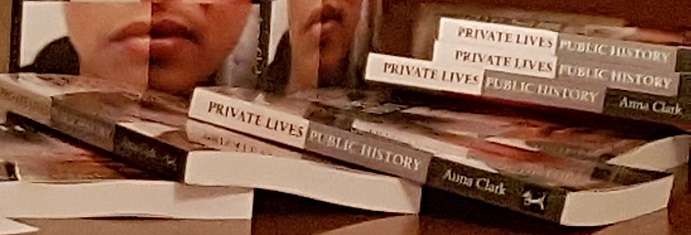Dr Anna Clark’s 2016 Peter Tyler Oration left her PHA audience with an important challenge: how does the profession build the connections between people’s appetite to understand where they came from and the broader story of society’s historical development?
![20160720_190607[1]](http://www.phansw.org.au/wp-content/uploads/2016/07/20160720_1906071-e1469070733186-106x150.jpg) This is the task uncovered by Clark’s research into ordinary Australians’ attitude to history. She conducted interviews with some 100 people in five communities that reflect Australia’s diversity: Marrickville and Chatswood in Sydney, Brimbank in Melbourne, Rockhampton and Derby. Her findings are published in Private Lives Public History (Melbourne University Press).
This is the task uncovered by Clark’s research into ordinary Australians’ attitude to history. She conducted interviews with some 100 people in five communities that reflect Australia’s diversity: Marrickville and Chatswood in Sydney, Brimbank in Melbourne, Rockhampton and Derby. Her findings are published in Private Lives Public History (Melbourne University Press).
Clark wanted to explore why people connect with local, intimate history but are alienated by national history. Her answer: that for most people the strongest connection to the past is personal. This is not a surprising finding but deserves articulation, given that for too many learning history at school is a bad memory of something boring or irrelevant. It may in turn provide the key to how we present a national narrative that resonates with the public.
If we can do this, we are likely to find a wide audience (as is demonstrated by the popularity of TV shows on genealogy; historical novels, biography and memoir; historical tours), especially as Clark also detected an ‘abstract agreement’ among her interviewees that we should know Australian history. People told her that we need to know where things come from.
What Clark is advocating is not populist or fictionalised history. She argues for a balance of historical empathy and judgement and for the importance of the broader context that can shed light on the course of individual lives. Her interviews suggest a recital of ‘factoids’ won’t hit the mark. We have to work harder at finding the hook that will excite the audience’s interest. To illustrate her point, she cited the reaction of one boy to a question about Federation. His reply went something like this: ‘Like, I’m a 17- year-old; I don’t think forming a government in 1900 is all that exciting’.
One way forward perhaps is to harness the activity being generated in the private sphere by people investigating their genealogy, collecting artifacts and documenting their family stories. We should be able to weave these personal threads into larger historical narratives, thus bridging the gap Clark describes between private and official versions of the past.
by Francesca Beddie

Well said, Anna and Francesca. I’ve thought for some time that Australian history would be rewritten if the research of family historians were widely disseminated. Well maybe not rewritten as much as many more interesting and nuanced narratives might find their way into the public domain.
Agree with all and great comment Pauline. “A recital of ‘factoids’ won’t hit the mark” is so true especially for history tour and other public history that is presented with an historical character/person.
Thanks Anna for the thoughtful address. If the interesting personalities and motivations of well known historical figures are examined they become more realistic for readers, people they can relate to with all their strengths and foibles just like us all. The ‘why’ approach to individuals and historical contexts, delivered with a dose of enthusiasm can make all the difference.